A Central American migrant named Enrique looks at the news from Honduras on his mobile phone, with his son Ian on his back, as they rest for the night at an abandoned hotel in Matias Romero, Oaxaca state, Mexico, Thursday, Nov. 1, 2018. TThousands of migrants arrived in the town of Matias Romero after an exhausting 40-mile (65-kilometer) trek from Juchitan, Oaxaca, where they failed to get the bus transportation they had hoped for. (AP Photo/Rodrigo Abd)
The Associated Press
DONAJI, Mexico (AP) - As President Donald Trump ramped up his anti-migrant rhetoric ahead of Tuesday's midterm elections, exhausted Central Americans walking across Mexico in hopes of reaching the United States said they were mostly perplexed and turned off by his threats, which they perceive as exaggerated.
The U.S. president has spent the final days of the campaign hammering the issue as he tries to energize Republican voters, and his favorite target has been the migrant caravan of almost 4,000 people that is still more than 800 miles away from the nearest U.S. border. Three smaller ones are following behind it.
Trump's recent statements include that he plans to sign an order that could lead to the detention of migrants crossing the southern border, and barring anyone caught crossing illegally from claiming asylum. Both propositions are legally dubious. Trump also said he had told the U.S. military mobilizing at the southwest border that if U.S. troops face rock-throwing migrants, they should react as though the rocks were "rifles."
"It is pure ignorance for him to think like that," said Marta Cuellos, a 40-year-old from Tegucigalpa, the Honduran capital. "A rock is not the same as a rifle."
While some migrants have clashed with Mexican police at a bridge on the Guatemala border, most of those traveling with the caravans have been peaceful and say they are fleeing violence and poverty at home. Those traveling through the southern state of Oaxaca on Friday said they are not looking for trouble.
Cuellos said she owned a cantina back home in Honduras but left because she could no longer make rent and was being harassed by police. She persuaded her 35-year-old sister to join her on the trip, and said the only thing they want is work and a better life in the United States. It's her second attempt. She first crossed into the U.S. seven years ago but was deported last year.
Selvin Maldonado, a 25-year-old from Copan, Honduras, said he left his wife and baby daughter at home in search of a better living to support his children. He took his 5-year-old son, Dennys, with him.
"What Trump said is stupid," Maldonado said while walking to the town of Donaji. "I don't want to attack police, because my concern is my son."
The migrants also were also turned off by the U.S. president's characterization of the slow-moving caravan and the three smaller ones following as "invasion." Trump has proposed detaining migrants in massive tent cities at the border.
"We are not killers," said Stephany Lopez, a 21-year-old Salvadoran with the first caravan. "We just want to work for a few years, and after that he can deport us if he wants."
Lopez noted that the president's mother, who was born in Scotland, was an immigrant.
"He should think of us as equals. Immigrants have built that country," she said.
In June, U.S. Attorney General Jeff Sessions said that domestic and gang violence would generally no longer be accepted as reasons for migrants to be granted asylum. Trump has said this week that those in the caravan would not get asylum - though U.S. law allows them the right to apply - and warned them to turn around.
The Trump administration's vehement opposition and tough rhetoric has at least some in the caravan weighing alternatives.
Tifany Morandis, 19, was traveling with her husband, 28-year-old Javier Sanchez, and their two sons, 7-year-old Angel and 9-month-old Cesar. Her nose and face sun-scorched after many days on the road, she said she was very tired and is considering stopping in Tijuana, the Mexican border city across from San Diego.
"Donald Trump has made things very complicated at the border, and better that we stay in Tijuana than fight with him," Morandis said.
But many are hopeful. "Even stones can soften," Cuellos said.
Migrants carry a friend to an ambulance after suffering a heat stroke, at an abandoned hotel in Matias Romero, Oaxaca state, Mexico, Thursday, Nov. 1, 2018. Thousands of migrants arrived in the town of Matias Romero after an exhausting 40-mile (65-kilometer) trek from Juchitan, Oaxaca, where they failed to get the bus transportation they had hoped for. (AP Photo/Rodrigo Abd)
The Associated Press
Central American migrants, part of the caravan hoping to reach the U.S. border, get a ride on a truck, in Donaji, Oaxaca state, Mexico, Friday, Nov. 2, 2018. The migrants had already made a grueling 40-mile (65-kilometer) trek from Juchitan, Oaxaca, on Thursday, after they failed to get the bus transportation they had hoped for. But hitching rides allowed them to get to Donaji early, and some headed on to a town even further north, Sayula. (AP Photo/Marco Ugarte)
The Associated Press
Honduran migrant Luz Padilla Valverde, carrying her child, begs for contributions of one peso (5 cents) from passing drivers, as a thousands-strong caravan of Central Americans hoping to reach the U.S. border stops for the night, in Matias Romero, Oaxaca state, Mexico, Thursday, Nov. 1, 2018. Most of the main caravan of Central American migrants spent a rain-drenched night outside, before continuing their slow walk through southern Mexico.(AP Photo/Rebecca Blackwell)
The Associated Press
Central American migrants, part of the caravan hoping to reach the U.S. border, get a ride on trucks, in Donaji, Oaxaca state, Mexico, Friday, Nov. 2, 2018. The migrants had already made a grueling 40-mile (65-kilometer) trek from Juchitan, Oaxaca, on Thursday, after they failed to get the bus transportation they had hoped for. But hitching rides allowed them to get to Donaji early, and some headed on to a town even further north, Sayula. (AP Photo/Marco Ugarte)
The Associated Press
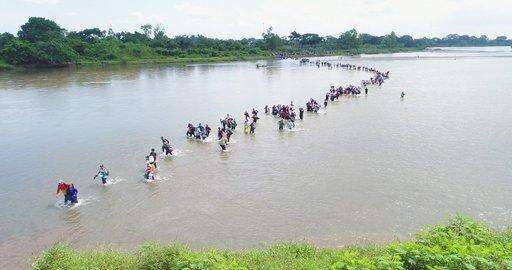
Salvadoran migrants cross the Suchiate river, the border between Guatemala and Mexico, on Friday, Nov. 2, 2018. A new group of Central American migrants has started on its way North with the stated purpose to make to the United States. The third caravan tried to cross the bridge between Guatemala and Mexico, but Mexican authorities told them they would have to show passports and visas and enter in groups of 50 for processing. The Salvadorans expressed misgivings that they would be deported, so they turned around and waded across a shallow stretch of the river to enter Mexico. (AP Photo/Oscar Rivera)
The Associated Press
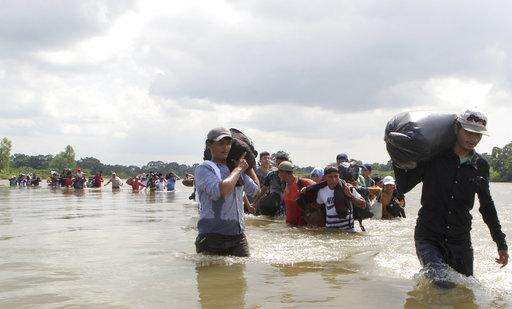
Salvadoran migrants cross the Suchiate river, the border between Guatemala and Mexico, on Friday, Nov. 2, 2018. A new group of Central American migrants has started on its way North with the stated purpose to make to the United States. The new caravan tried to cross the bridge between Guatemala and Mexico, but Mexican authorities told them they would have to show passports and visas and enter in groups of 50 for processing. The Salvadorans expressed misgivings that they would be deported, so they turned around and waded across a shallow stretch of the river to enter Mexico. (AP Photo/Diana Ulloa)
The Associated Press
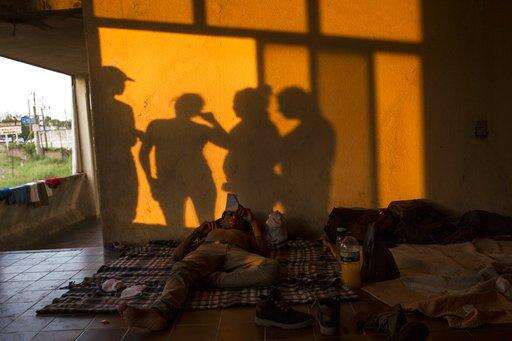
Honduran migrants, part of the thousands-strong caravan of Central Americans migrants hoping to reach the U.S., rest in an abandoned hotel in Matias Romero, Oaxaca state, Mexico, Thursday, Nov. 1, 2018. Thousands of migrants arrived in the town of Matias Romero after an exhausting 40-mile (65-kilometer) trek from Juchitan, Oaxaca, where they failed to get the bus transportation they had hoped for. (AP Photo/Rodrigo Abd)
The Associated Press
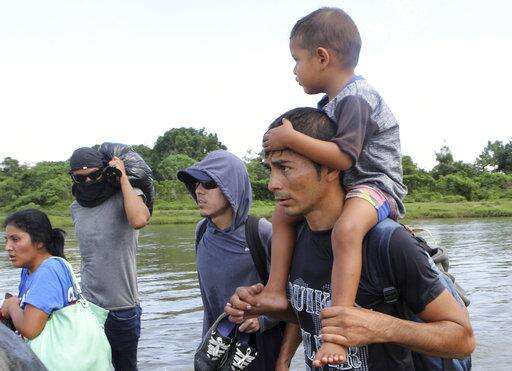
Salvadoran migrants cross the Suchiate river, the border between Guatemala and Mexico, on Friday, Nov. 2, 2018. A new group of Central American migrants has started on its way North with the stated purpose to make to the United States. The new caravan tried to cross the bridge between Guatemala and Mexico, but Mexican authorities told them they would have to show passports and visas and enter in groups of 50 for processing. The Salvadorans expressed misgivings that they would be deported, so they turned around and waded across a shallow stretch of the river to enter Mexico. (AP Photo/Diana Ulloa)
The Associated Press
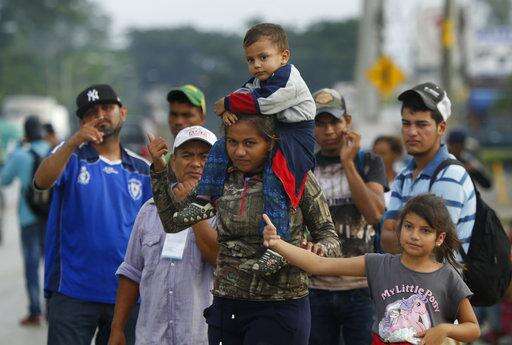
Central American migrants, part of the caravan hoping to reach the U.S. border, ask for a ride as they hitch hike in Donaji, Oaxaca state, Mexico, Friday, Nov. 2, 2018. The migrants had already made a grueling 40-mile (65-kilometer) trek from Juchitan, Oaxaca, on Thursday, after they failed to get the bus transportation they had hoped for. But hitching rides allowed them to get to Donaji early, and some headed on to a town even further north, Sayula. (AP Photo/Marco Ugarte)
The Associated Press